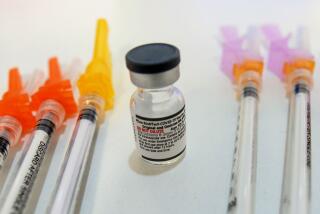Higher Vitamin E Doses Can Help After 65, Study Finds
- Share via
CHICAGO — Moderate supplements of vitamin E, already believed to protect older people from heart disease and dementia, also boost the immune system in people over 65, a new study found.
The research suggests that older people ought to take about 20 times more vitamin E a day than the current recommended daily allowance of 8 to 10 milligrams, the authors said.
“We looked at three different levels of vitamin E--60, 200 and 800 milligrams, and the 200 milligrams seemed to be optimal,” said immunologist Simin N. Meydani of the USDA Human Nutrition Research Center on Aging at Tufts University in Boston.
The researchers compared supplements with a placebo among 88 healthy people age 65 and older. They reported the results in Wednesday’s issue of the Journal of the American Medical Assn.
Daily 200-milligram supplements for four months increased subjects’ T-cell function by 65% and their response to hepatitis B vaccine sixfold, compared with placebos, researchers said.
T-cells are white blood cells that help fight viruses and tumors and contribute to the body’s defenses in other ways. Vaccine response refers to the level of protection that a vaccine provokes in the body.
No adverse effects were reported. Doses of 800 milligrams boosted immunity similarly in those measures and others, but pushed them no higher, Meydani said.
“The problem with a lot of studies in nutrition is that you find something [beneficial], and people think more must be better,” Meydani said. “You don’t really have to go above 200 milligrams.”
Other studies have indicated that vitamin E supplements can protect against heart disease, cancer and even Alzheimer’s disease, apparently by neutralizing destructive molecules known as free radicals, which result from metabolism and disease-fighting activity.
But while vitamin E is generally considered safe at high doses, research has linked supplemental levels with an increased risk of bleeding-type strokes. That could be important in people taking anti-clotting drugs, including aspirin, Meydani said.
And a recent study found that excess levels of the form of vitamin E found in most supplements--alpha-tocopherol--may block the protective effects of another form of vitamin E found in most foods--gamma-tocopherol.
People should consult their doctors before taking any vitamin E supplement, Meydani said.
Some doctors may not recommend supplements for immune-boosting effects until they are shown to ward off sickness, she said.
“There is a possibility that the amount of increase that we saw in the immune response is not actually associated with a decrease in incidence of infections,” she said. She is undertaking that research now.
Vitamin E, found in high-fat foods such as soybeans, uncooked oils, nuts and the germ of grains, could never be consumed in the diet in sufficient quantities to reach the supplemental levels in Meydani’s study and others.
Many labels list vitamin E in international units instead of milligrams. For natural vitamin E, 1 milligram equals 1.43 IU; for synthetic vitamin E, 1 milligram equals 1.1 IU, Meydani said.





